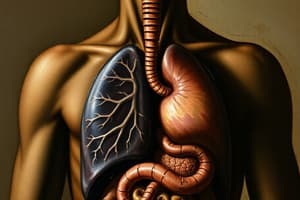Podcast
Questions and Answers
Where does the chemical digestion of proteins begin?
Where does the chemical digestion of proteins begin?
- spleen
- stomach (correct)
- small intestine
- large intestine
- mouth
Which of the following statements about the organs of the digestive system is true?
Which of the following statements about the organs of the digestive system is true?
- The pancreas secretes a substance that emulsifies fat globules.
- The stomach secretes most of the enzymes needed for carbohydrate digestion.
- The gallbladder stores secretions from the small intestine and empties them into the liver.
- The digestion of food particles takes place in the small intestine, but the absorption of these digested particles takes place in the large intestine.
- Although protein digestion begins in the stomach, pancreatic enzymes break the final polypeptide chains into amino acids. (correct)
What would happen if the liver were unable to produce enough bile salts?
What would happen if the liver were unable to produce enough bile salts?
- The rate of protein digestion would decrease.
- Lipase activity would increase.
- Mucus in the alimentary canal would increase.
- Fatty acid absorption would decrease. (correct)
- Glucose absorption would decrease.
Which of the following macromolecules go directly from the lumen of the small intestine to the epithelial cells of the intestine and on through to the bloodstream?
Which of the following macromolecules go directly from the lumen of the small intestine to the epithelial cells of the intestine and on through to the bloodstream?
Another name for the alimentary canal is ________.
Another name for the alimentary canal is ________.
The region of the digestive tract most responsible for absorption of nutrients is __________.
The region of the digestive tract most responsible for absorption of nutrients is __________.
Which of the following represents the path taken by food after leaving the mouth?
Which of the following represents the path taken by food after leaving the mouth?
The process by which food is propelled through the digestive tract by alternating contraction and relaxation of smooth muscle is
The process by which food is propelled through the digestive tract by alternating contraction and relaxation of smooth muscle is
During swallowing,
During swallowing,
Gastric juice in the stomach is composed of
Gastric juice in the stomach is composed of
Pepsin is a digestive enzyme that specifically targets
Pepsin is a digestive enzyme that specifically targets
Bile is produced by the __________ and stored by the __________.
Bile is produced by the __________ and stored by the __________.
The pancreas aids in the chemical digestion of food by
The pancreas aids in the chemical digestion of food by
Elimination of undigested food material from the large intestine is controlled by
Elimination of undigested food material from the large intestine is controlled by
The gastrointestinal tract is composed of __________.
The gastrointestinal tract is composed of __________.
Bile assists in the chemical digestion of triglycerides by
Bile assists in the chemical digestion of triglycerides by
Study Notes
Digestion of Proteins
- Chemical digestion of proteins begins in the stomach, where enzymes break down polypeptides.
- Pancreatic enzymes further digest proteins into amino acids in the small intestine.
Digestive System Organs
- Small intestine is primarily responsible for digestion and absorption of nutrients.
- The pancreas secretes digestive enzymes and bicarbonate into the duodenum for fat emulsification.
- Bile is produced by the liver and stored in the gallbladder, aiding fat digestion.
Effects of Bile Salt Production
- Insufficient bile salts result in decreased fatty acid absorption, affecting nutrient uptake.
- Increased mucus in the alimentary canal does not ensure effective digestion or absorption.
Absorption of Macromolecules
- Carbohydrates and proteins are absorbed directly from the lumen of the small intestine into the bloodstream.
- Lipids are emulsified by bile before being absorbed.
Alimentary Canal Terminology
- Another term for the alimentary canal is the gastrointestinal tract, encompassing the entire digestive pathway.
Pathway of Food
- Food travels from the mouth through the pharynx, esophagus, stomach, small intestine, and then to the large intestine.
Propulsion of Food
- Peristalsis is the process where smooth muscle contractions propel food through the digestive tract.
Swallowing Mechanism
- During swallowing, the epiglottis closes the trachea to prevent food from entering the airway, ensuring safe passage.
Composition of Gastric Juice
- Gastric juice contains hydrochloric acid (HCL), gastric fluids, and pepsinogen, crucial for digestion in the stomach.
Function of Pepsin
- Pepsin specifically digests proteins by breaking them down into smaller peptides.
Role of the Pancreas
- The pancreas plays a significant role in digestion by releasing enzymes and bicarbonate to neutralize stomach acid in the duodenum.
Elimination Process
- Undigested food elimination from the large intestine is regulated by the defecation reflex, ensuring waste is properly expelled.
Structure of the Gastrointestinal Tract
- The gastrointestinal tract includes all hollow organs involved in digestion, from the mouth to the anus.
Role of Bile in Fat Digestion
- Bile emulsifies large fat droplets, increasing surface area for enzymatic action and enhancing triglyceride digestion.
Studying That Suits You
Use AI to generate personalized quizzes and flashcards to suit your learning preferences.
Description
Test your understanding of digestive system topics with these flashcards covering key concepts from Chapter 14 of Human Biology. The questions explore the beginning of chemical digestion and functions of various digestive organs.




